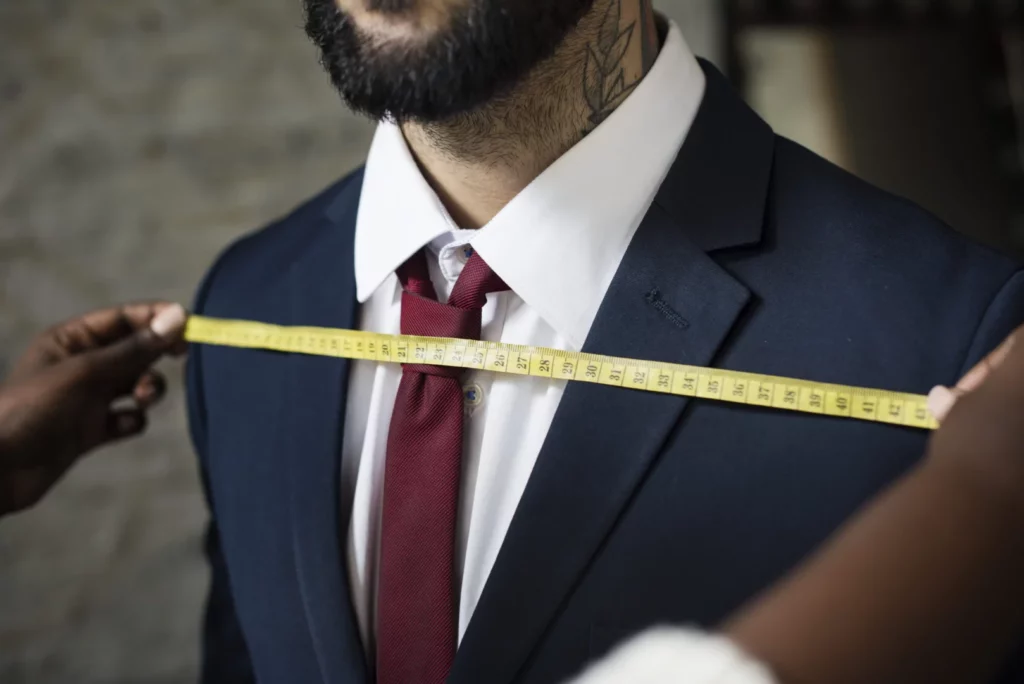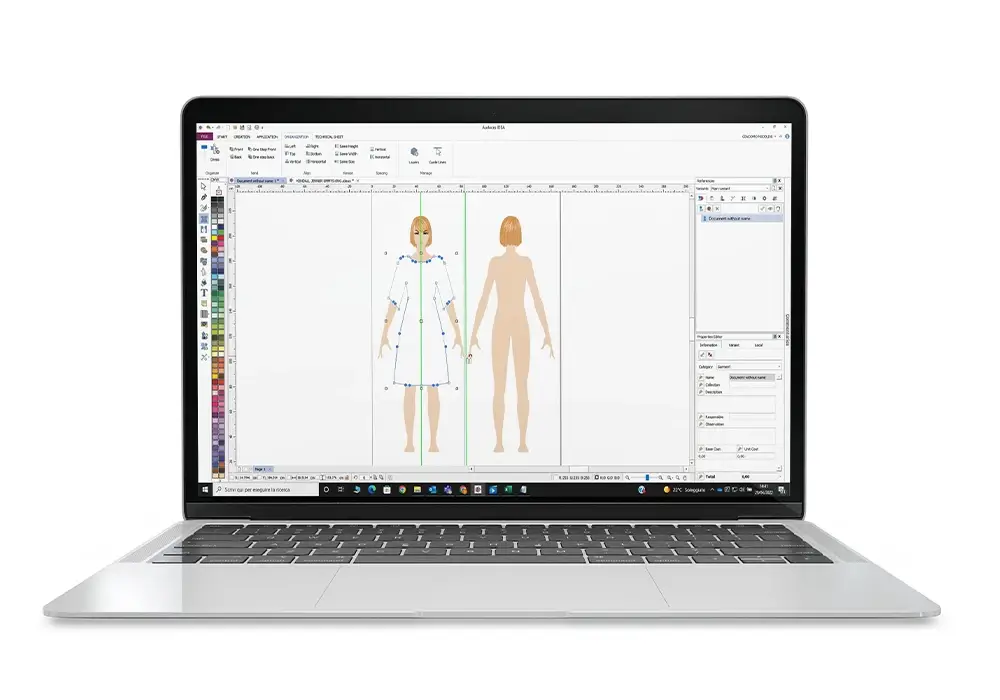Summary
- Having a men’s clothing size chart streamlines the production process and enhances the customer experience.
- A well-established size chart minimizes the need for exchanges, allowing consumers to find their perfect fit.
- Audaces supports your company throughout the fashion production journey, including comprehensive size standardization. Sign up for the Audaces360 multi-solution free trial now!
In the dynamic and competitive world of fashion, creating an exclusive men’s clothing size chart is fundamental.
This measurement serves as a centralized standard for dimensions, ensuring that garments fit impeccably for a broad range of customers.
Consequently, this practice simplifies the purchasing journey, enabling consumers to effortlessly discover sizes that align with their unique measurements.
Join us as we unravel each step of creating a men’s clothing size chart and learn how to craft one for your apparel business!
Sumário
Happy reading!
What is the role of a men’s clothing size chart?
Defining a men’s clothing size chart is imperative for various reasons. It establishes a consistent standard for sizes, ensuring that garments fit the majority of customers appropriately.
Moreover, it streamlines the shopping experience for customers, facilitating the discovery of sizes that align with their measurements.
This practice also contributes to minimizing the number of product returns caused by sizing issues, ultimately saving the company time and resources.
By providing well-fitting clothes, it not only enhances customer satisfaction but also elevates comfort when using the brand’s products.
For manufacturers, a well-defined size chart aids in optimizing the production process and reducing material waste.
A brand that prioritizes well-fitting clothes and acknowledges size diversity projects a positive image of customer concern.
Learn more: Discover how can technology revolutionize menswear production

What are the key challenges in establishing men’s clothing sizes?
Establishing men’s clothing sizes has some challenges for brands.
Overcoming these aspects requires dedicated market research, meticulous data collection, and a flexible sizing approach that accommodates the diverse range of body types and consumer preferences.
Many forward-thinking brands are incorporating technology, such as 3D modeling, to enhance precision in crafting clothes that cater to a variety of shapes and sizes.
Explore some common challenges faced by companies in the creation of men’s clothing sizes:
Variety of body types
Men exhibit a broad spectrum of body shapes and sizes, presenting a challenge in creating sizes that cater to all customers. From tall and thin to short and stocky, the diversity requires a nuanced approach to sizing.
Learn more: How to deliver a successful experience in your men’s fashion online store
Regional differences
Men’s size preferences and body types can vary significantly between different regions within the same country, complicating the development of a universal size chart.
Materials and stretch
The different stretch properties of fabric materials impact the fit of clothing. Brands must carefully consider these factors when establishing sizes to ensure a comfortable fit across various materials.
Learn more: Uncover the fabric composition chart and the most utilized types
Stock and returns
A poor fit can lead to issues like overstocking certain sizes or a high number of returns, impacting the brand’s financial performance.
Learn more: Discover 8 best practices for optimizing apparel inventory management
Understanding the measures
Ensuring customers correctly interpret sizing measurements can be challenging, given the slight variations in sizing systems employed by different brands.
How to achieve precision in a men’s clothing size chart?

To ensure accuracy in creating a men’s clothing size chart, adopting a meticulous and well-researched approach is crucial, given that sizing is an ongoing and evolving process.
As fashion trends and consumer preferences continually evolve, it’s essential to regularly adjust and update your size chart to effectively align with market demands.
Here are some actionable steps:
Research competitor sizes
Analyze the size charts of other brands and competitors in the market to gain valuable insights into industry sizing norms and customer expectations.
Listen to customer feedbacks
Collect feedback from existing customers, paying close attention to insights about the fit and comfort of clothes. Identify which sizes are in high demand or frequently returned.
Define relevant body measurements
Determine the most pertinent measurements for the garments you produce, including leg length, waist and chest circumference, height, and other relevant dimensions.
Use official standards as reference
Refer to official measurements provided by global organizations, such as the ASTM International standards, some ISO standards, or country-specific guidelines, ensuring a basis for establishing standard measurements.
Analyze sales data
Examine sales history to identify the sizes with the highest demand. This data-driven approach helps determine the most popular sizes among your customers
Learn more: Boost your e-commerce store with a clothing virtual fitting room
Conduct market research
Undertake market research to comprehend consumer size preferences and current trends. Utilize methods like online surveys, interviews, or focus groups to gather valuable insights.
Invest in 3D modeling
Harness the power of 3D modeling technology as a valuable tool for crafting clothes that fit well on diverse body types. This technology allows for virtual simulations, enabling you to assess how clothes will fit before physical production.
Learn more: Learn what 3D modeling is and its benefits for clothing design and production
Streamlining your men’s clothing size chart with Audaces technology

The efficiency of Audaces technology is a game-changer for standardizing a men’s clothing size chart, for instance.
Explore key features of Audaces360, Audaces Idea, and Audaces Pattern that help in apparel production:
Audaces360
In the fast-paced world of fashion, Audaces360 revolutionizes production processes.
This software integrates the entire manufacturing cycle into a single platform, enhancing efficiency and reducing errors.
Audaces360 multi-solution’s main benefits include:
- Integrated phases from creation to production
- Timely production delivery
- Reduced raw material loss
- Increased profit margins
- Accelerated production processes
- Lower operating costs
Audaces Idea

A powerful solution for stylists and fashion professionals, Audaces Idea automates tasks, allowing for creativity and innovation, helping with men’s clothing size chart creation.
Check out some recent improvements that enhance usability:
- Intuitive design manipulation
- Efficient shape point selection
- Enhanced formula editing for precise calculations
- Improved file integration from Audaces Pattern
Audaces Pattern
Audaces Pattern facilitates dynamic pattern development, simplifying design and production.
Among the recent improvements in this solution, the following stand ou
Enhancements to DXF notches import
Now, the software has significantly improved the import of nicks from DXF files.
This means designers can more effectively incorporate daub data into their designs, saving time and avoiding common import errors.
Improved export to ASTM Standard
Exporting Audaces files to the ASTM standard has undergone improvements, ensuring accurate adherence to specifications.
This enhancement is crucial for meeting quality requirements and ensuring compatibility with other systems and processes in the fashion industry.
Improved Text Import/Export Behavior
In the latest update, text import/export functions not only convey essential information but also include relevant notes.
This enhancement streamlines communication and documentation when collaborating with industry professionals, ensuring clarity on pattern details.
To discover how to elevate your collection featuring a men’s clothing size chart with the help of the best technological multi-solution available, download our free e-book now!
FAQ
Creating a men’s clothing size chart is crucial for maintaining a consistent standard, ensuring an appropriate fit for the majority of customers.
Discover common challenges in creating men’s clothing sizes: body type variety, regional differences, material considerations, stock management, and understanding measurement metrics.
To ensure accuracy in men’s clothing sizing, adopt a careful and well-researched approach, considering ongoing adjustments to align with evolving fashion trends and consumer preferences.






